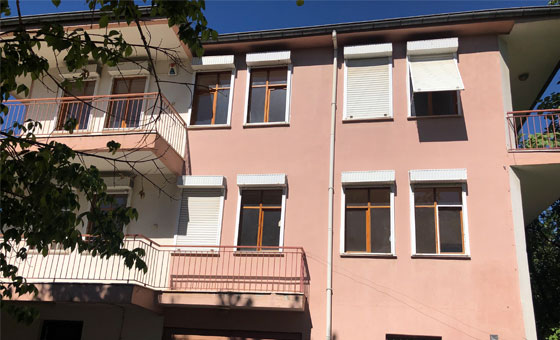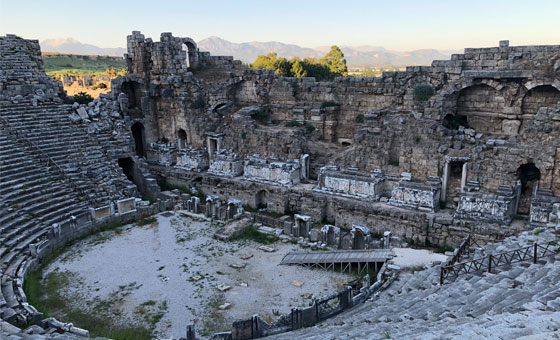Overview
Delve into the intriguing history of southwest Turkey’s Elmali Plain, where past climate changes and human-driven environmental shifts have left profound imprints on the region’s landscape and societies. Join us as we embark on a multidisciplinary exploration to reconstruct ancient environmental conditions and unravel complex interactions between humans and their surroundings.
Field school highlights:
- Dig into the archaeological wonders of Hacimusalar Mound, a rich tapestry of Byzantine churches, Hellenistic structures, an Early Bronze Age fortress and more.
- Participate in cutting-edge research techniques investigating how past climate fluctuations impacted the region’s ecosystem and how local cultures adapted.
- Play a hands-on role in understanding and conserving the site’s cultural heritage.
| Course Details | |
|---|---|
| Course Dates | July 13 – August 10, 2025 |
| Course Type | Paleoenvironmental Studies, Archaeometry, Geoanthropology, Archaeology |
| Instructors | Dr. Bülent Arıkan |
| Credits* | 8 semester (12 quarter) |
| Apply By | March 1 |
| Fees Due By | April 15 |
| Program Fees | (2025) |
|---|---|
| Tuition | $4,570 |
| Transcript Fee* | $300 |
| Health & Evacuation Insurance | $160 |
| Room & Board | $1,6500 |
| TOTAL: | $6,680 |
This program is closed and is no longer accepting new applications.
Instructors
The directors welcome emails and inquiries about the research elements of this project. More general information (tuition, health insurance, and payment schedule) can be found under the ‘Students’ tab above. Any further questions may be addressed to IFR staff. Additional details about research, course schedule, travel, accommodation, and safety can be found on the syllabus. Contacting the directors or the IFR office is encouraged and appreciated. It may help you determine if this field school is a good fit for you.
Testimonials
This is a new IFR field school. Check back after the first field school season and see what our students have to say!
Payment & Student Fees
Application Fee: There is a $45 fee to submit an online application.
Deposit Payment: A nonrefundable $500 deposit is due within 3 weeks of program acceptance in order to secure your place. The remainder of your program fees are due by the deadline indicated under “Course Details”.
*Transcript Fee & Academic Credit Opt Out: If you wish to participate in an IFR field school without earning academic credits, you will not be charged a transcript fee.
For more information about payment, fees, and policies, please see details under our Payment & Finances and Withdrawal and Cancellation Policy pages.
Accommodations
The Excavation House is a three-story structure with a large yard in the front. It is situated at the center of Elmalı in a residential neighborhood. Students will sleep on bunkbeds in shared rooms that may have up to 4 bunkbeds. There is a shower/restroom on each floor, and additional showers and and restrooms on the ground floor. The house also contains study areas both inside and outside. We also have outdoor study areas. All rooms have proper ventilation (windows, balconies) and lighting.
The cost of all meals is included in the program fee; however, students will be responsible for purchasing their own meals if they choose to travel on Sunday evening and Monday. Food will not be served at the Excavation House on Sunday (dinner) and Monday (breakfast and lunch) as the cook will be taking day off as well. The kitchen and the fridge are open to students during these times. Alternatively, you may visit one of many restaurants at the town. Monday dinner is a communal event and the team is expected to be present at the dinner table. We are providing halal Mediterranean cuisine and we can accommodate vegetarian diet. We cannot accommodate Vegan, Kosher, high protein or other types of diets.


Travel Info
Natural disasters, political changes, weather conditions and various other factors may force the cancellation or alteration of a field school. IFR recommends students only purchase airline tickets that are fully refundable and consider travel insurance in case a program or travel plans must change for any reason.
General information for this program is below, but keep in mind we will discuss any updated travel information and regulations during the required program orientation, which could affect travel plans.
Most inbound transatlantic flights arrive at Istanbul Airport (code: IST). You will have a connecting flight from Istanbul Airport to Antalya International Airport (code: AYT), which usually takes about one hour. Under normal circumstances you will clear customs at Antalya and leave the Airport from the International Arrivals Gate. The Project Director will meet you outside the Gate. The trip from the Airport to the excavation house at Elmalı takes about 1.5 hrs. Most inbound flights from European cities have direct flights to Antalya International Airport.
VISA REQUIREMENTS
As students will be participating in academic and scientific research, they must obtain research visas from Turkish embassy or consulates before arriving in Turkey. Please consult the website for detailed information: https://www.mfa.gov.tr/general-information-about-turkish-visas.en.mfa. Paperwork to expedite your visa procedure will be provided by the Director. Citizens of other countries are asked to check the embassy website page at their home country for specific visa requirements.
Due to the legal requirements in Turkey, EFSG has to finalize the list of applicants by March 1 Please note the earlier deadline.













